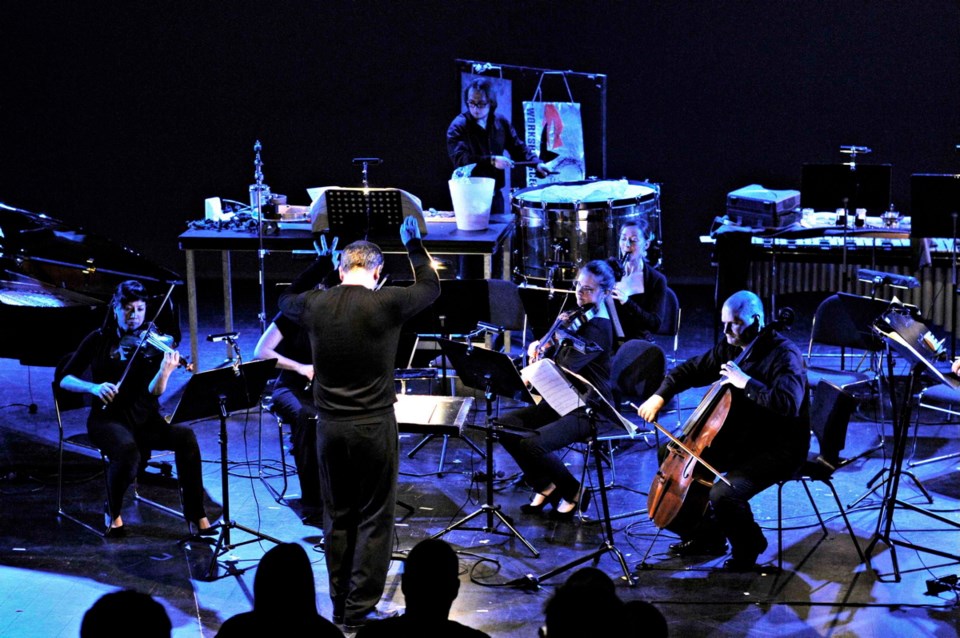The terrific modern-music program on offer tonight from the Emily Carr String Quartet is part of the University of Victoria’s Alumni Concert Series, and rightly so: Two of the quartet’s members (violist Mieka Michaux and cellist Alasdair Money) hold music degrees from UVic, as does one of the featured composers, Cassandra Miller, who now lives in Montreal.
The ECSQ performs standard repertoire with commitment and ardour, but seems to take special pleasure in more adventurous modern repertoire. Tonight’s program spans more than half a century, from Shostakovich’s concentrated String Quartet No. 7 (1960) to Miller’s Warblework (2011), which is based on the songs of thrushes. It also includes the moving Tenebrae (2002), by Argentinian composer Osvaldo Golijov.
The big news on the program, however, is (pardon the oxymoron) an avant-garde classic: Black Angels (1970) by George Crumb, who has been a seminal American composer since the 1960s and is still active at age 85 (his latest work will have its première in March).
Black Angels is scored for “electric string quartet.” The instruments are amplified, to produce (in Crumb’s words) “a highly surrealistic effect.” And the ECSQ will be using, in effect, period instruments — electronics matching as closely as possible those that would have been used in 1970.
The “surrealism” of the music is enhanced by extended techniques and unusual sonorities. The performers sometimes bow on the fingerboard, scrape or strike the strings, play with a metal pick or a glass rod or thimbles. They are even directed to sing, shout, whisper, whistle and click their tongues. They play other instruments, too: maracas, tam-tams, water-tuned glasses.
(The published score, needless to say, is unconventional, often bizarrely twisted and fractured.)
All this “surrealism” serves a programmatic purpose. Subtitled 13 Images from the Dark Land, the work was Crumb’s response to the Vietnam War, “a kind of parable on our troubled contemporary world.” It depicts a three-stage voyage — “Departure (fall from grace), Absence (spiritual annihilation) and Return (redemption)” — and conveys a good-versus-evil polarity in various ways: “God-music” and “Devil-music,” numerological symbolism, quotation, allusion and pastiche.
In its use of wildly heterogeneous “collage” as well as its political engagement, Black Angels is a quintessential product of the 1960s avant-garde. It encompasses a whole world — and does so in just 20 minutes.
The Aventa Ensemble’s next concert, on Sunday, Feb. 8, will culminate in a work from 2002 that Aventa is boldly promoting as one of the first masterpieces of the 21st century: VOI(rex), for voice, six instruments and electronics, by French composer Philippe Leroux.
Leroux, 55, whose body of work is large and diverse, is widely performed and admired, especially in Europe.
Since 2011, he has taught composition at McGill University in Montreal. He is also composer-in-residence with the Meitar Ensemble in Tel-Aviv.
Comprising a short introduction and five movements and running about 25 minutes, VOI(rex) is based on freely adapted poetry, the meaning, structure, phonetic components and even calligraphy of which are used to generate music.
Regina-based soprano Helen Pridmore, a renowned contemporary-music specialist who has worked twice with Aventa in recent seasons, will tackle the vocal part, which demands not just singing but a huge repertoire of wails, gasps, moans, whispers, warbles, coughs and other sounds. The instrumental ensemble employs a no-less-dazzling palette of techniques and sonorities, and there is also a crucial role played by live electronic processing, which Leroux will handle in Aventa’s concert.
Preceding VOI(rex) will be a shorter but no less virtuosic quintet by Leroux, Continuo(ns) from 1994. The first half of the program will comprise two more recent instrumental works by Canadian composers: evanescence, a sextet with live electronics by Gordon Fitzell, who teaches at the University of Manitoba in Winnipeg; and La forma dello spazio, a quintet by Zosha di Castri, who recently joined the faculty at Columbia University in New York.
Later this month, Aventa will embark on its first tour of Australia. Beginning Feb. 27 at the Adelaide Festival of Arts, it will participate in three performances of Gavin Bryars’ chamber opera Marilyn Forever.
A concert in Sydney will follow on March 3.
What: University of Victoria Alumni Concert Series: Emily Carr String Quartet.
When/where: Tonight, 8 p.m., Phillip T. Young Recital Hall (School of Music, MacLaurin Building, University of Victoria)
Tickets: $18, seniors and students $14, alumni free. Call 250-721-8480; online at tickets.uvic.ca; in person at the U.Vic. Ticket Centre.
What: Aventa Ensemble: VOI(rex), conducted by Bill Linwood.
When/where: Sunday, Feb. 8, 8 p.m., Phillip T. Young Recital Hall; pre-concert talk at 7:15
Tickets: $20, seniors and students $18. Online at aventa.ca.



